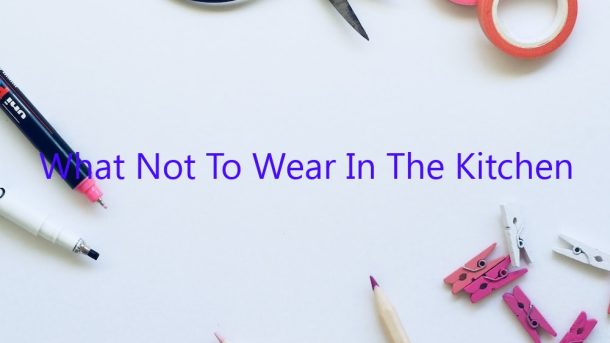When you’re in the kitchen, the last thing you want to worry about is your outfit. Unfortunately, some people manage to make kitchen fashion mistakes that can lead to accidents or just make them look silly. If you want to avoid these mistakes, read on.
The number one rule of kitchen fashion is to wear clothes that can get dirty. You never know when something is going to splatter or when you’re going to have to scrub a pot or pan. So, leave the silk blouse at home and put on something practical.
Another thing to avoid is wearing loose clothing. This is especially important if you are working with hot oil or flames. Loose clothing can easily catch on fire, and that’s definitely not something you want to happen in the kitchen.
Another thing to avoid is wearing high heels. You may think that they make you look sexy in the kitchen, but they can actually be very dangerous. Heels can easily slip on wet surfaces or in puddles of water. If you’re going to be doing a lot of walking in the kitchen, it’s best to wear flats instead.
Finally, avoid wearing jewellery. It’s easy for a piece of jewellery to get caught on something and pull it off. If you’re going to wear jewellery, make sure it’s made from a sturdy material that won’t easily break or catch on something.
Contents
What is the dress code in the kitchen?
When it comes to the dress code in the kitchen, there are a few things that are important to keep in mind. For one, it is important to wear clothing that is comfortable and won’t get in the way while you are cooking. It is also important to wear clothing that is easy to clean and won’t stain easily. In general, it is a good idea to avoid wearing clothing that is too tight or too loose, as both can be a safety hazard in the kitchen.
Some people choose to wear aprons while they are cooking, and there are a variety of different aprons available on the market. If you choose to wear an apron, make sure that it is made of a material that can be easily cleaned and is also non-flammable.
When it comes to footwear, it is important to wear shoes that are closed-toe and have a non-slip sole. This is especially important when you are working with slippery ingredients or surfaces.
In general, it is a good idea to dress casually when you are cooking in the kitchen. However, there are a few exceptions to this rule. If you are cooking in a professional kitchen, it is important to wear clothing that is appropriate for the workplace. And if you are cooking a special meal that requires a more formal dress code, be sure to follow those guidelines.
What should not be allowed in the kitchen?
There are many things that should not be allowed in the kitchen. This is because the kitchen is a place where food is prepared and cooked. Here are some of the things that should not be allowed in the kitchen:
1. Pets: Pets should not be allowed in the kitchen because they can contaminate the food with their fur and saliva. Pets can also spread diseases in the kitchen.
2. Dirty Dishes: Dirty dishes should not be allowed in the kitchen because they can contaminate the food. Dirty dishes can also harbor bacteria that can cause food poisoning.
3. Cigarette Smoke: Cigarette smoke should not be allowed in the kitchen because it can contaminate the food with nicotine and other chemicals. Cigarette smoke can also cause fires in the kitchen.
4. Chemicals: Chemicals should not be allowed in the kitchen because they can contaminate the food. Chemicals can also cause fires and explosions in the kitchen.
Do and don’ts in kitchen?
The kitchen is often considered the heart of the home. It’s a place where family and friends come together to cook and share a meal. While there are many things that can make the kitchen a happy and welcoming place, there are also a few things that can make it a little less enjoyable. Here are a few do’s and don’ts for the kitchen.
DO:
-Clean up as you go. This will make cleaning up later much easier.
-Be mindful of your language. The kitchen is often a place where families and friends gather, so be respectful of others.
-Respect the kitchen appliances. Don’t try to put anything in the oven that isn’t meant to be cooked in there, and don’t put too much pressure on the stovetop.
-Be aware of your surroundings. Make sure that you aren’t blocking the walkway or the sink with your cooking.
DON’T:
-Leave dirty dishes in the sink. This will just make it harder to clean up later.
-Cook with high heat. Not only can this be dangerous, but it can also create a lot of smoke and odors.
-Use the kitchen as a dumping ground. If you have dirty dishes, pots, or pans, take them to the dishwasher or the sink.
-Be messy. The kitchen is a place for cooking, not for storing your junk.
What are the 5 rules in the kitchen?
There are many rules in the kitchen, but here are five of the most important ones:
1. Wash your hands before you start cooking.
This is one of the most basic rules in the kitchen. It’s important to wash your hands before you start cooking, especially if you’re handling food that will be eaten raw. Washing your hands will help keep you and your family safe from harmful bacteria.
2. Use safe food handling practices.
It’s important to use safe food handling practices when you’re cooking, especially when you’re preparing food for people who are vulnerable to food-borne illnesses, such as young children, the elderly, and pregnant women. Some basic safe food handling practices include washing your hands thoroughly, keeping food at the correct temperature, and avoiding cross contamination.
3. Follow the recipe.
If you’re not familiar with a recipe, it’s important to follow it as closely as possible. If you make changes to the recipe, you run the risk of making the dish unsafe to eat.
4. Clean up as you go.
It’s important to clean up as you go when you’re cooking. This will help keep your kitchen clean and organized, and it will make the cooking process a lot easier.
5. Store food properly.
It’s important to store food properly when you’re not using it. This will help keep the food safe to eat and it will help keep your kitchen clean.
What are the 4 golden rules in the kitchen?
There are a few key things to remember when cooking in the kitchen – and following these four golden rules can help make your experience a lot smoother.
1. READ THE INSTRUCTIONS CAREFULLY
This is probably the most important rule of all. If you don’t read the instructions, you might not cook the food properly and it could end up being ruined.
2. KEEP YOUR KITCHEN CLEAN
This is especially important if you’re cooking something that might make a mess. Make sure you clean up as you go, so you don’t have to deal with a huge cleanup later on.
3. USE THE RIGHT EQUIPMENT
If you’re using the wrong equipment, it could lead to disaster. Make sure you’re using the right pots, pans, knives, and utensils for the job.
4. FOLLOW THE TIMINGS
If you’re not following the timings correctly, your food could end up being over or undercooked. Make sure you’re paying close attention to the recipe, so you know how long to cook your food for.
What are the 4 C’s of kitchen hygiene?
There are four key principles of kitchen hygiene that should be followed in order to prevent the spread of bacteria and other contaminants. These are called the four Cs: cleanliness, caution, cooking, and Cross contamination.
The first C is cleanliness. This means keeping your work surface, utensils, and hands clean. Always wash your hands before and after handling food, and be sure to sanitize your work surface with a bleach solution or commercial sanitizer. Utensils should be washed in hot, soapy water, and then rinsed and sanitized.
The second C is caution. This means being careful not to cross contaminate food. Do not use the same utensils to cook raw meat and vegetables, for example, and always wash your hands thoroughly after handling raw meat.
The third C is cooking. This means cooking food properly to kill any bacteria that may be present. Food should be cooked to a safe internal temperature, and leftovers should be reheated to a safe temperature.
The fourth C is Cross contamination. This means preventing bacteria from spreading from one food to another. Always wash your hands thoroughly, keep raw meat and vegetables separate, and never put cooked food on a plate that has held raw food.
Following these four Cs will help you to keep your kitchen clean and safe and will help to prevent the spread of bacteria and other contaminants.
What is the number 1 rule of the kitchen?
There are many rules when it comes to the kitchen, but there is one rule that reigns supreme: always wash your hands. This is the number one rule of the kitchen for a reason – it is essential to keeping yourself and your food safe.
Washing your hands properly is key in preventing the spread of bacteria. Make sure to scrub your hands for at least 20 seconds, and make sure to get in between your fingers and under your nails. If you are cooking with raw meat, you should also scrub your hands after handling the meat.
It is also important to keep your kitchen clean. Make sure to wipe down your counters and kitchen surfaces regularly, and always wash your dishes and utensils as soon as you are finished using them.
By following these simple rules, you can help keep your kitchen safe and clean.



